
From top left: Debbie Young, Joy Kauffman, Patricia LaVanture, and Jill Morikone. From bottom left: Kathy Morrissy, Julia O'Carey, Trudi Starlin, and Amy Ratsara. | photo credit: Dave Sherwin
As assistant prosecutor for Kalamazoo County in Michigan, this involves preparing for court hearings taking place that day via Zoom, touching base with her coworkers, and attending online meetings and court hearings. When the nanny heads home, Ratsara begins the evening work of dinner, laundry, errands and spending time with the boys while her husband, a pastor, finishes up his workday. The next morning at 6 a.m., it all begins again.
Jill Morikone starts her day at 5 a.m. with prayer and Bible study. She’s at work by 7:30 and faces an unpredictable onslaught of tasks, which, as VP and chief operating officer for 3ABN, may include the following: executive committee meetings, brainstorming sessions for new programming, helping the pastoral team respond to tough questions from viewers, dealing with HR issues, recording a sermon, approving projects, signing contracts, magazine planning, and checking in with 3ABN Australia and 3ABN Russia. If there is no live programming that day, she’s home by 7:30 p.m., and she and her husband eat dinner together with a strict no-technology rule. After clean-up, it’s an evening of catching up on emails missed throughout the day, and her head hits the pillow anytime between 10 p.m. and midnight. She’s up and running again at 5 a.m. the next day.
Although very different and living in different states, these women’s lives are tied together with a thread that connects them also to other women leaders around the world — a thread called ASI: Adventist-layman’s Services & Industries. ASI’s motto, “Sharing Christ in the Marketplace,” drives the organization to promote a Christ-centered lifestyle in which “members seek to experience God’s love in their own lives and share that love with the people they encounter in their everyday work and activities.” And while membership is diverse, including men, women, businesses and ministries, one demographic stands out: the women leaders.
ASI is a sisterhood of service, with women from all walks of life falling in line behind Jesus to willingly and prayerfully follow in His footsteps. Their combined passion, energy and dedication can and do fuel thousands of efforts for Christ around the world, whether it be at home, in the courtroom, among refugees, in a hospital, from the podium, doing financial counseling, speaking on TV, providing health education, or myriad other situations. And it all comes together through ASI, redefining ministry and connecting everyone to the resources they need to fulfill Christ’s mission no matter where or how they serve.
“There were times I considered being a teacher like both of my parents, but I kept coming back to law.” Amy Ratsara took a year off after graduating from college, trying to determine what it was she was being called to do with her life. “God made it clear this was the direction He wanted me to go, so I applied to law school.”
As her county’s assistant prosecutor, Ratsara reviews complaints from police agencies and decides whether or not to issue warrants for the misdemeanors or felonies, then follows them through to court.
This isn’t a typical or perhaps expected role for a pastor’s wife, but Ratsara says that’s part of what she loves about it.
“As a kid, I saw women building their careers in various fields, and I saw others making their homes and families their careers, and none of it seemed weird or wrong,” she says. But as she got older, she began to sense that within the church there seemed to be a message to young women that God could call you to be a professional without a family, or he’d call you to marriage and family life, and you’d be “the queen of your household.” It was an “either/or” message — one with which Ratsara did not identify.
“In my own life, I sensed a dual calling,” she states. “Feeling conflicted doesn’t have to mean one or the other has to go; for some, it may, but that doesn’t make it true for everyone.”
Ratsara makes it clear that her family comes first, but she also gives her all in her professional life. And she considers both her ministry. While shining a light for Christ can be as overt as exclaiming “Praise the Lord!” when things go well, Ratsara also points out that there is something even more important and effective to the cause.
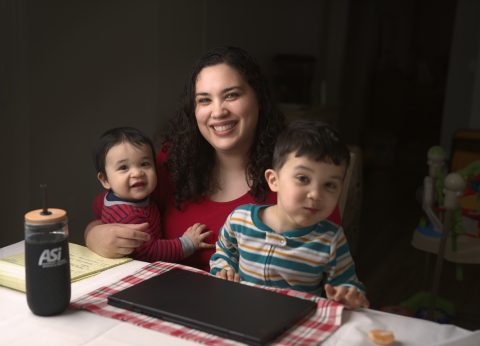
“One of the biggest things we can do to put a good reflection on Him is to be excellent at what we do,” she says. “One of my favorite quotes is from the Spirit of Prophecy, where it says that the strongest argument in favor of the gospel is a loving and lovable Christian. The way I’ve behaved sets me apart and gives others an opportunity to ask why I’m different. When you combine excellence in both work and character, it opens doors for conversations which ultimately lead to what looks more like traditional ministry.”
That is the heart of ASI — which is part of why Ratsara is a member and sits on the board of ASI Missions, Inc. Not only does her philosophy line up with ASI’s, but being a member of the organization gives her the tools she needs to keep her generation engaged with the church.
“Anyone who is a child of God can be a minister in their field,” she emphasizes. “No matter where or how He’s called them to do so.”
Kathy Morrissy, a certified financial planner in Lisle, Illinois, spends her days advising people on how to handle their personal finances. She, too, views her daily work as an opportunity for ministry.
“Sometimes I fall into the trap of thinking that because I’m not out there doing ‘missionary things’ I’m not doing anything,” Morrissy shares. “But the truth is, when I’m at work I’m not just offering advice, I’m chatting with people, asking about grandkids, and helping them make solid plans for their future, and those plans often involve the church. I may not be out there building a church, but I can be part of the machine that drives those projects.”
The firm where Morrissy works is a member of ASI and has been for most of her life. She knows this because the business was started by her father, and she grew up attending ASI conventions. Now, as she prepares to take over her father’s role after he retires, Morrissy sees the benefit of being part of ASI more than ever — both as a businessperson who wants to support ministry, and as a professional who wants to share Christ in the workplace in her own way.
At 26, Morrissy falls into a unique category of young female certified financial planners; only 23.3 percent of CFP professionals are female, and only 5.5 percent are under 30.
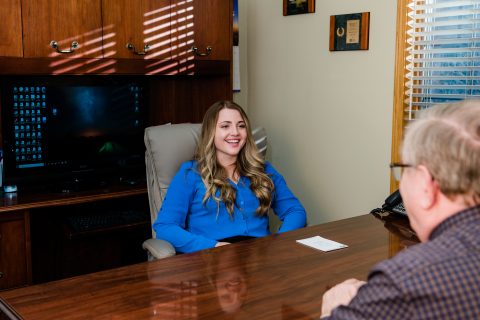
“I’m in a unique position to reach a certain group of people,” she says. “I hope to help young women with financial literacy, which leads to financial independence.”
Morrissy also is vice president of Communication for ASI Lake Union, using her skills to keep ministries and businesses across the Lake Union connected.
“Every time I go to an ASI convention, I’m refreshed,” she says. “There are people out there doing great things and it’s inspiring. They’re not just talking about Jesus, but they’re showing people what Christianity is about. That’s what I hope to do in my career, too.”
Much like Morrissy, who grew up around financial experts and attending ASI conventions, Julia O’Carey’s ministry began in childhood. In 1980, her parents accepted a two-month assignment in Thailand which turned into a seven-year ministry in refugee camps.
“I’ve had this in my heart and blood ever since I was little,” O’Carey says. When her mom founded ASAP (Advocates for Southeast Asians and the Persecuted) Ministries in Berrien Springs, Michigan, O’Carey says she loved watching God work through her, and that her own faith in the Lord has grown in leaps and bounds since officially joining her mom in the ministry.
That was 15 years ago. Today O’Carey is the executive director of ASAP Ministries, a role she’s filled for six years now. One of the greatest lessons her mother, Judy, taught her was to commit everything to prayer. This was her key to success as a leader in missions and Julia continues to keep prayer a main component of the culture of ASAP, its lifeblood. If you visit their office, you will likely see prayer happening spontaneously somewhere, and formally in staff and board meetings. They even close the office at noon for prayer.
“Prayer truly is the breath of our souls here at ASAP,” Julia shares. “God faithfully hears and answers our prayers because reaching the poor, the persecuted, the unreached and refugees is high on his priority list too.”
ASAP is rapidly growing, now supporting 86 schools around the world for at-risk children who would never otherwise have a chance for education, let alone Christian education. Multiple church plants now exist and thrive across nations where most are Buddhist or Muslim. They experience miraculous answers to prayer on a daily basis, thanks to the work O’Carey’s mother began, and she herself continues, where the emphasis is on training local people to share the gospel holistically across the 10/40 window.
As vice president for Evangelism for ASI Lake Union, O’Carey sees her role as one of inspiration and encouragement, helping members find the tools and opportunities to share the gospel with anyone with whom they come into contact.
“I know a little something about Divine appointments,” she says with a laugh, “so I’m sending a book called Divine Appointments, by Dr. Tom Evans, to each ASI member to help them stay ministry-focused even during COVID. Whenever we find tools to help, we share them. I know from personal experience the joy of praying for Divine appointments and then seeing the Holy Spirit work on people’s hearts. Nothing is better than being in the center of God’s will, moment by moment.”
One of those receiving that book is Debbie Young, an oncological nurse navigator in Ypsilanti, Michigan, who spends her days walking patients through one of the darkest valleys of their lives, setting up medical tests and meetings with specialists, and providing logistical support for families.
“I’m a nurse because God deemed it so,” she says confidently. “Considering all of the opportunities I’ve had here to share and talk about Jesus, my being here is very clearly a Divine appointment.”
In 2018, the tables were turned when Young received her own cancer diagnosis. Fortunately, it was treatable through surgery, but she says the experience allowed her to really understand her patients and what they go through which has increased her ability to minister to them.
“I have been given the gift of being able to approach each of them with a perspective of experience on a personal level,” she shares, “and my own journey through cancer has given me opportunities to pray with my patients, opening doors that may not otherwise have been there.”
When she’s not at the hospital, Young opens doors for others to share Christ by running a Christian radio station out of her home, providing inspirational music 24/7. When she and her husband started Quiet Moment Radio in 1989, the idea was to share what the Adventist Church was doing around the world, including interviews with ministry leaders and inspirational stories from those in the mission field.
One year, they attended an ASI convention where they discovered that many of the ministry leaders Young had been interviewing on-air about their initiatives and community involvement were ASI members. They joined, too, and since then Young has served as president of ASI National chapter, the first woman and the first African-American to do so. She currently chairs a committee and serves on the board of the Lake Union chapter.
“The type of people who are connected through ASI really have a heart for reaching people and meeting their needs,” she says. “To be associated with and working with a group of people who have that purpose singularly in their minds is motivating and inspiring, is spiritually rejuvenating, and helps me stay focused on the right things, doing what God wants us to do.”
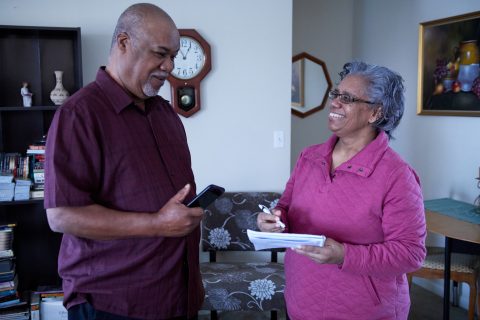
Doing what God wants us to, however, sometimes means accepting a reality we never wanted. This is part of Jill Morikone’s journey with God.
“I was making bread in our kitchen at home when the doctor called,” she recalls. “After a series of tests and consultations, they had concluded that there was nothing they could do — my husband and I would never have children.”
Those eight words were the end of a lifelong dream for Morikone, who had always loved kids and had dreamed of having her own family. She cried, wondering how the God who had caused the blind to see, the cripples to walk, and the dead to live again wouldn’t do this one thing for her.
Finally, she felt God tap her on the shoulder and say, “Jill, my daughter, count your blessings.” She brushed Him off, saying, “God, I need some pity right now.” After some time spent grieving, Morikone says she made a decision.
“I chose to praise Him,” she says simply, with tears in her voice. She began to offer up thanks for all she had — her husband, her church, her family, her friends, her health — and, as she recounted her blessings, she felt God remove a piece of the pain from her heart.
Now, 16 years later, Morikone is able to use her experience to help other women going through similar pain. As VP and chief operating officer for 3ABN in West Frankfort, Illinois, she receives countless messages daily from women around the world, asking her for advice, thanking her for being an inspiration, and wondering how they, too, can become a leader.
“I think God has given women unique gifts,” she comments. “Some of those gifts are compassion, empathy, intuition and discernment. I believe this makes a difference within an organization. God places different people in different positions for His own purposes, and this is mine.”
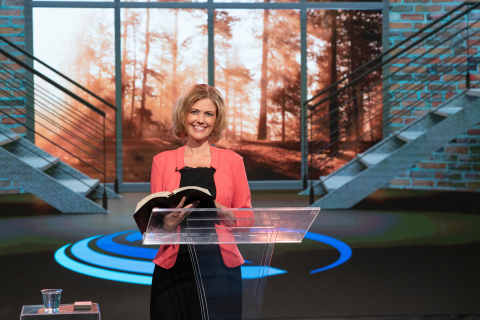
In fact, those same attributes are what led Joy Kauffman, ASI Lake Union president, to start her ministry in 2015.
“Really one of the biggest motivations for FARM STEW International is my own experience as a mother and imagining what would go on in my psyche if I couldn’t feed my children and how devastating that would be,” she explains. “Recognizing there are many mothers in that position, most through no fault of their own, spurred me to action.”
And so, FARM STEW International was born.
FARM STEW, based in Princeton, Illinois, equips local people in Uganda, South Sudan, Zimbabwe and Cuba to teach their neighbors in rural communities to farm, improve sanitation, enjoy whole food plant-based nutrition, start small businesses, and access clean water and menstrual hygiene products. In just five years, they’ve already made a huge impact. An external evaluation in South Sudan, one of the top five poorest countries in the world, revealed that FARM STEW had taken the number of malnourished children from 59 percent to 3 percent in 18 months.
Having worked for the federal government in the Department of Health and Human Services, local government health departments and nonprofits, Kauffman says there was always some part of herself she couldn’t bring to the table. With training in nutrition and a master’s degree in Public Health from Johns Hopkins University, Kauffman’s dream was always to combine her ministry calling, training and passion into a powerhouse for health and wellbeing education around the world.
“It bothered me that there was no Adventist health message focused on the world’s extreme poor,” she says. “I felt that if Jesus brought the good news to the poor, then our health message which gives us another 7 to 10 years of longevity must be relevant to farmers in Africa and Southeast Asia where the majority of the world’s poor live.”
Kauffman continues: “ASI is part of the reason we can do what we do. ASI gives us the opportunity to collaborate with businesses who will take us on as missional partners, and the resources and inspiration to come up with our own business ideas which make us self-sustaining. This increases our capacity to scale our ministry big-time, and our ability to really be salt and light is so much greater than if we’re all just sitting around with our hands out.”
So, between checking emails from Africa at 5 a.m., studying her Sabbath School lesson (and maybe preparing to teach that coming Sabbath), praying with a friend on the phone, greeting her teenagers before school, database development, management meetings, cooking classes she teaches as Health Ministries director for her church, and spending time with her family, Kauffman also is fulfilling her duties as president for ASI Lake Union.
“If there’s one thing I’ve learned over the years, it’s that when God calls, He does equip,” she says. “Even though I had a plethora of excuses why it shouldn’t be me doing this work, He simply showed me He’d already equipped me to do exactly those things. I had no need to be fearful.”
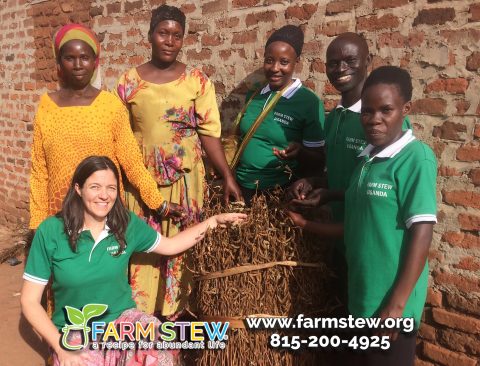
Trudi Starlin, ASI board member, is an architect by training, office manager of an electrical contracting company through marriage, and an advocate for refugees by Providence.
Many of her Sabbaths are now spent at churches across the country, building relationships between refugees and local Adventist churches. She also plans large conventions attended by hundreds of Karen, tailored to meet their needs for spiritual skills training and social interaction. And there’s a very special reason for this.
In 2008, Starlin learned there was a group of Karen in a town three hours away who needed a translator. Originally from Burma (now Myanmar), Starlin speaks both Burmese and Karen (a tribal language), and she was able to connect with one of the refugees. She learned there were about 25 of them, including children, desperate for a place to worship.
“They, like many others, were legally sponsored by the United Nations to enter the U.S., escaping the violence in their former country,” she explains. “Because of the work of Eric and Agnes Hare a century ago in Burma, the first thing these refugees do when they arrive is look up an Adventist church. Unfortunately, there is a very strong language barrier.”
Starlin had to do something. Bridging the gap, she used her language skills to make arrangements for the refugees to use space at a local Adventist church to worship in their own language. Word got around and, before she knew what was happening, Starlin was helping Karen, Mizo and Zomi refugees all over the U.S. connect with Adventist churches to find spaces to worship in their native tongue.
Over the past decade, Starlin has helped organize six congregations of refugees from Myanmar across the nation and (pre-pandemic) spends many weekends traveling from her home base in Berrien Springs, Michigan, to visit these congregations and speak to them. This is not, however, her strong suit — or, at least, it wasn’t.
“That just wasn’t me,” she says. “But God has taught me to rely on Him, to hear His voice, and to be there for His people. There are plenty of times we’ve felt exhausted from traveling, speaking, organizing and trying to take care of our home and ASI member business, but somehow God always provides the energy.”
And she needs it! Starlin starts her day early with personal devotions then worship with her husband, then fills her day with tasks related to their electrical business, her work with refugees, errands, and tasks around the house. On the weekends, the Starlins have been known to host Bible study groups or welcome university students who need a break from their studies. And in between it all, she’s translating and advocating for the 55 groups of Karen refugees around the country who need a voice within the Adventist church — within their church.
“It’s important to me that these beautiful people know they aren’t put aside or left alone, but that our church is embracing them,” Starlin says with feeling. “We want them to be and feel part of the church, so the mission, for us, is here.”
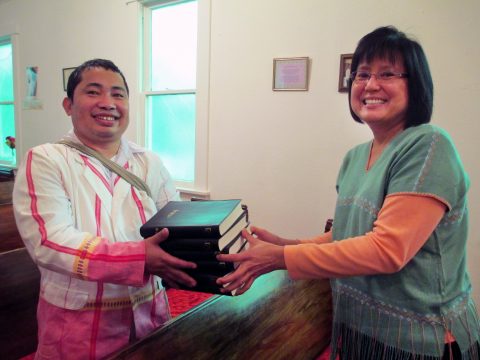
Patricia LaVanture never felt embraced by her childhood church. She struggled to feel accepted because she had a lot of questions, and while she knew there was a God and that He should be revered, she didn’t understand why He had to die. The Bible remained a complete mystery. The one thing she did understand was healthy living.
“Both in and out of school, I’d read anything I could find to learn more about the nutrition properties of various types of foods, healthy lifestyle tips, exercise — everything related to overall health and wellbeing,” LaVanture recalls.
By the time she was 25, a lot of bad things had happened in her life, and she was discouraged, lost and confused. One evening, she felt impressed to turn on her television to the Christian station.
“A woman’s face filled the screen,” LaVanture says. “She was saying, ‘It’s not by chance you’ve turned on this television program,’ and she began to talk about Jesus.” The woman on TV talked about why Jesus had to die, and how He longs to come into our lives and mend our brokenness. LaVanture was stunned.
“My eyes were opened and I saw my life from God’s perspective . . . my heart was so broken,” she says. “I found myself praying for forgiveness, and I heard God say He loved me, He forgave me, and that He was going to be with me. I felt so light and loved.”
As soon as she’d given her heart to Jesus, LaVanture prayed that He would help her find the church where she was supposed to be. Through a series of special circumstances, God led LaVanture to a small Adventist congregation meeting on the top floor of an apartment building, where the presenter happened to be speaking about how to prepare healthy desserts.
“I almost fell out of my chair,” LaVanture says, laughing. “Healthy living wasn’t trendy at the time, and here I was, surrounded by people I didn’t know, discovering a church whose gospel message included a health message. It was nothing short of Divine leading.”
Today, LaVanture is Lifestyle Program director at Oak Haven Health (home of Country Life Natural Foods) in Pullman, Michigan, and Programming director for ASI. Anything that happens onstage during an ASI convention is, from start to finish, managed by LaVanture. She says she’s “the backstage person praying and helping people shine for Jesus,” knowing that what happens on that stage goes around the world, and may help others, like she did, find their calling.
Her work with Oak Haven Health gives her the opportunity to exercise her passion for healthy living through health evangelism. She’s led groups in reversing diabetes, depression recovery and healthy lifestyles, as well as training others at churches across the country to conduct their own health evangelism.
“I read somewhere from Ellen White years ago the idea that many people are searching for answers in health, but they don’t know that what they’re really searching for is God,” LaVanture says. “That’s what’s exciting for me because the thing about health education is that you can help people where their needs are and you can draw them closer to God through the whole educational experience. It’s an opportunity that’s non-threatening to draw closer to people and help them get closer to God. That's my mission.”
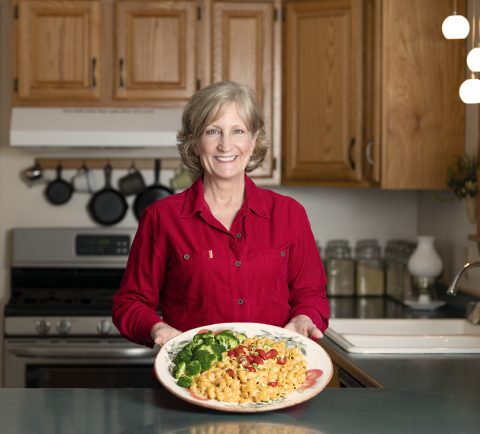
Each of these women has been called by God to serve Him in a very specific way, and each of them continues her personal journey with Him to fulfill that calling. Despite the apparent ease with which these women have filled their roles, their work, like that of any leader and minister, is not always easy.
Combined, these women supervise nearly 900 people spread across nearly every continent, doing everything from education to broadcasting, from housekeeping to writing, from healthcare work to volunteering. Most of them are up before the sun and are still awake long after it disappears in order to hold meetings across global time zones, keep up with emails, and make time for family and self-care.
And then there’s the obvious fact that they are women in a male-dominated world.
“To be honest, I wrestled with the decision to accept the executive director position at ASAP Ministries,” O’Carey admits. “We work among many strongly patriarchal cultures in Southeast Asia, and I felt the work might move forward more rapidly if a man with pastoral and administrative experience assumed the position. So, when ASAP’s board of directors initially asked me, I turned it down.”
A year later, however, they asked again. This time, O’Carey fasted and prayed, seeking the Lord’s will. She felt led to study the leaders portrayed in 1 and 2 Chronicles, and quickly picked up on a pattern of success.
“It was not their age, experience, heritage, inheritance, or any personal attributes that gave them success,” she concludes. “It was simply those who purposed in their hearts to be fully committed to the Lord and allow Him to lead through them who prospered.”
This newfound insight gave O’Carey the confirmation she needed to accept the position, and she resolved to always seek and follow God’s direction in prayer as she leads.
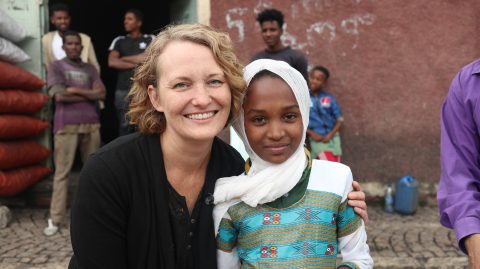
“It is important for us to keep in mind the calling and mission that God has given each of us,” LaVanture urges. “I am not just a Christian; I am a Christian woman, and that is a very special calling. As women, we are called to reveal Christ not only through our Christianity, but also through our femininity.”
Often, feminine attributes are considered to be “soft” with a negative connotation, but the truth is, there is a softer side to God which we sometimes overlook.
“We, as women, have been made in the image of God,” says Young. “As such, we possess unique attributes which play an important role in reaching the hearts of those with whom we interact. In my work at the hospital, my ability to listen well and extend a compassionate ear, to encourage excellence, and to communicate directly but with understanding, and seeking Divine perspective makes a difference.”
Ratsara points out that traditional roles for women in the Adventist Church have been teacher, doctor, nurse and mom. Certainly, her career in law would not be considered traditional.
“No one would say outright that those are the only options available, but the message we receive is exactly that,” she says. “The fact is, though, that women are making up more and more of the workforce. If God needs missionaries everywhere, that includes places of work outside the home, and outside of the church. It’s not unreasonable to expect God to call us to have multifaceted experiences because we will have more in common with other people as we widen our circle of influence. God needs people to shine their light everywhere.”
Being able to relate to a person’s experience always amounts to a stronger connection, and there are things women experience to which only other women can relate. Morikone’s infertility journey has taught her surrender and how to find peace in Christ, which is something most women need and long to feel.
“I've had the privilege of praying with many of my sisters in Christ — women who've come up to me after I speak at a women's retreat and poured out their unanswered questions, their unfulfilled hopes and dreams, their pain and hurt.” She shares that there have been women whose children are in prison, women whose children were murdered, women who have endured abuse of many different kinds.
“Life is messy sometimes,” she concludes. “It definitely can be painful, but, in the midst of it all, our Savior is ready to heal and make whole. That’s the message I want to share through sharing my experience.”
Behind these successful and confident women marches another generation of capable and willing women, ready to take the torch when it is passed to them. The sisterhood of service must include those who come after.
Young knows this to be true because she regularly acknowledges and thanks those who have gone before her, both in radio and healthcare.
“What I have appreciated the most about women in leadership who have gone before me is the time they invested the time and love to pour into me tricks of the trade, cautions, encouragement and affirming my potential,” she recalls. “They have been conduits of blessing to me and I just want to pay it forward. The greatest compliment I can receive is the success of another who has taken advantage of the wisdom I’ve sought to impart from what I’ve learned.”
Mentorship is hugely important. Some of these women have been interviewed by university students seeking insight into what it looks like to climb to the top as a woman, and how they can do it, too. Most manage other women in their roles and are in a position to empower, uplift and inspire. Others have the opportunity to offer internships to the next generation of professionals and get them engaged in ministry before they even become part of the workforce.
“Paul talks about the older women mentoring younger women,” Morikone says. “In my position at 3ABN, I have the opportunity and privilege to make opportunities happen for other people. That includes women. This excites me! Something that was difficult for me is something I now have the privilege to freely extend to someone else, and that is thrilling!”
Although not every woman has the opportunity to be a mentor, sometimes just showing up is enough.
“I think just being there, being active, and doing a good job provides an example and role model for younger women coming up,” Ratsara comments. “By following my own calling, I can be a light in the darkness for other Adventist women and girls wondering how they can contribute their various skills to the Lord's work.”
Women bring something special to the table. The responsibility of the sisterhood of ASI is to work toward every woman, everywhere, being able to reach her highest potential.
“Women, in the home or in the world, can do a work that often men cannot do, because womanhood brings gifts and talents into God’s work, and a way of seeing, a way of doing, that men do not possess,” LaVanture asserts. “Womanhood is a gift in the hand of our Maker to a dying world — a world dying for a revelation of what God is really like. Many of these attributes He can and does reveal through the beautiful, tender heart of a woman.”
Ellen White once wrote: “Woman does not know her power for God. . . . There is a higher purpose for woman, a grander destiny. She should develop and cultivate her powers, for God can employ them in the great work of saving souls from eternal ruin” (Testimonies, Vol. 4, 642, and Evangelism, 465).
The sisterhood is called to a great work, and they have answered faithfully.
Becky St. Clair is a freelance writer.